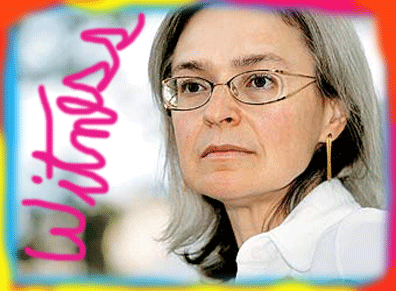
As I was sitting at my desk, trying to make sense of the story I’ve been working on this week, my thoughts drifted back to Tuesday night’s dinner, and the words of the women who wrestle with all the pesky, run-of-the-mill, day-to-day elements of journalism that the rest of us face: tracking down good sources, organizing the facts you’ve gathered so that they have some kind of meaning, and laying it all down in prose that you hope will will engage reader’s attention for at least a nanosecond.
Yet in addition to those routine tasks, these women who were honored–and journalists like them in countries around the world—- have to worry about whether they’ll make it through the day alive, or will ever see their kids again.
“If we go to jail, or are tortured, or eventually killed for being good journalists,” said Mexico’s Lydia Cacho at the end of her acceptance speech, “because of this award, we have witnesses. And, after tonight, you share the responsibility of knowing.”
I hereby pass that shared responsibility to you, dear WLA readers. Sometimes the fact of increased public scrutiny can protect a journalist who is at risk.
Sometimes, of course, it does not.
For me, the ever-present ghost of Monday’s dinner was the woman who was given the Courage in Journalism award in 2002, Anna Politkovskaya . I met Anna that same year when PEN USA gave her our International Freedom to Write Award for her risky reporting on the war in Chechnya, specifically the effect of the war on ordinary people. I’m on PEN’s board of directors so got to spend a little time with her. I remember thinking that she was one of the bravest people I’d ever met. She had been receiving death threats for a while back then. She didn’t disregard them, but nor did they slow her down. It was impossible not to worry about her.
One day—it was a year ago this October 6—the worst of the worries came to pass; Anna did not make it home. She was shot to death, execution style, in the elevator of her Moscow apartment building. It is taken for granted that she was murdered specifically because of her work. In fact, the day of her death she had planned to file a major story on the torture practices of Chechen security forces.
Yet, while those who killed her could take away Anna’s life, her future work, and her abitlity to be a mother to her now-grown children, to be a grandmother to her grandchild soon-to-be-born, they could not take away her power as a witness, a power that, because of her writing, she passed along to the rest of us.
On the first anniversary of her death, 2000 Russians braved a cold Moscow day to make it clear that they heard, they knew, and they weren’t going away.

A must see documentary.
http://www.hbo.com/docs/programs/childrenbeslan/
“In Russia, Sept. 1 is the Day of Knowledge, a joyous annual event marking the start of the new school year. But Knowledge Day 2004 was different at School No. 1 in Beslan: A group of heavily armed rebel extremists stormed the school, holding more than a thousand children and adults hostage in a sweltering gymnasium for three days. The harrowing siege ended Sept. 3 in a series of explosions and hail of gunfire that killed some 350 people – half of them children. Featuring heartbreaking interviews with more than a dozen young survivors, as well as chilling footage shot by the hostage-takers themselves, Children of Beslan explores the devastating impact of violent conflict on childrenâ€Â
See if this sounds familiar;
1) A group of radical Islamic terrorists attack and kill innocent civilians.
2) After this attack President Putin assumes personal control of appointing the governors of Russia’s oblasts, which were previously elected, saying it would boost security.
3) “Liberal Anti-Government†reporter Anna Politkovskaya is poisoned on the way to cover the story in Beslan. And later she is killed for reporting on the torture of citizens who the Russian government believes may have information on terrorists.
You have to watch out for crazy leaders like Putin, who use terrorist attacks to suspend democracy and civil liberties. Thank god for the brave liberal female reporters who are fearless and report a wide range of topics, such as government sponsored torture and the gangs of Los Angeles.
And why is it that our media produces and honors the likes of Maureen Dowd?
Thank god for the brave liberal female reporters who are fearless and report a wide range of topics, such as government sponsored torture and the gangs of Los Angeles.
Agreed.
Thanks for the big picture.
H.R. 1955: Violent Radicalization and Homegrown Terrorism Prevention Act of 2007.
The Internet has aided in facilitating violent radicalization, ideologically based violence, and the homegrown terrorism process in the United States by providing access to broad and constant streams of terrorist-related propaganda to United States citizens.